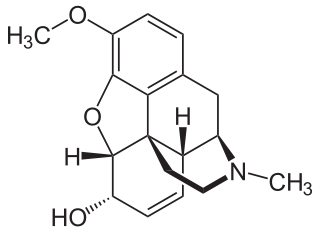
Paracetamol, or acetaminophen, is a non-opioid analgesic and antipyretic agent used to treat fever and mild to moderate pain. It is a widely used over-the-counter medication. Common brand names include Tylenol and Panadol.

Over-the-counter (OTC) drugs are medicines sold directly to a consumer without a requirement for a prescription from a healthcare professional, as opposed to prescription drugs, which may be supplied only to consumers possessing a valid prescription. In many countries, OTC drugs are selected by a regulatory agency to ensure that they contain ingredients that are safe and effective when used without a physician's care. OTC drugs are usually regulated according to their active pharmaceutical ingredient (API) and strengths of final products.

GSK plc is a British multinational pharmaceutical and biotechnology company with headquarters in London. It was established in 2000 by a merger of Glaxo Wellcome and SmithKline Beecham, which was itself a merger of a number of pharmaceutical companies around the Smith, Kline & French firm.

Rosiglitazone is an antidiabetic drug in the thiazolidinedione class. It works as an insulin sensitizer, by binding to the PPAR in fat cells and making the cells more responsive to insulin. It is marketed by the pharmaceutical company GlaxoSmithKline (GSK) as a stand-alone drug or for use in combination with metformin or with glimepiride. First released in 1999, annual sales peaked at approximately $2.5-billion in 2006; however, following a meta-analysis in 2007 that linked the drug's use to an increased risk of heart attack, sales plummeted to just $9.5-million in 2012. The drug's patent expired in 2012.

Dihydrocodeine is a semi-synthetic opioid analgesic prescribed for pain or severe dyspnea, or as an antitussive, either alone or compounded with paracetamol (acetaminophen) or aspirin. It was developed in Germany in 1908 and first marketed in 1911.

Excedrin is an over-the-counter headache pain reliever, typically in the form of tablets or caplets. It contains paracetamol, aspirin and caffeine. It was manufactured by Bristol-Myers Squibb until it was purchased by Novartis in July 2005 along with other products from BMS's over-the-counter business. As of March 2015, GSK holds majority ownership of Excedrin through a joint venture transaction with Novartis. On July 18, 2022, GSK spun off its consumer healthcare business to Haleon.

Codeine/paracetamol, also called codeine/acetaminophen and co-codamol, is a compound analgesic, comprising codeine phosphate and paracetamol (acetaminophen). Codeine/paracetamol is used for the relief of mild to moderate pain when paracetamol or non-steroidal anti-inflammatory drugs alone do not sufficiently relieve symptoms.

Butalbital/acetaminophen, sold under the brand name Butapap among others, is a combination medication used to treat tension headaches and migraine headaches. It contains butalbital, a barbiturate and paracetamol (acetaminophen), an analgesic. Versions also containing caffeine are sold under the brand name Fioricet among others. It is taken by mouth. The combination is also sold with codeine.
BC Powder is an American brand of over-the-counter analgesic pain reliever owned by Prestige Consumer Healthcare and manufactured in Washington, DC.
Goody's Powder, also called Goody's Headache Powders, is an over-the-counter aspirin/paracetamol/caffeine–based pain reliever, in single-dose powder form, which is marketed and sold by Prestige Brands. The powder delivery saves the time needed for the patient's digestive system to break down a tablet or capsule, ostensibly causing the medication to work faster. Goody's Extra Strength Powder consists of aspirin, caffeine, and paracetamol (acetaminophen) in a formula identical to that of Excedrin, a product of Novartis, but in the no-digestion-needed powder form.
Compound analgesics are those with multiple active ingredients; they include many of the stronger prescription analgesics.

Codeine is an opiate and prodrug of morphine mainly used to treat pain, coughing, and diarrhea. It is also commonly used as a recreational drug. It is found naturally in the sap of the opium poppy, Papaver somniferum. It is typically used to treat mild to moderate degrees of pain. Greater benefit may occur when combined with paracetamol (acetaminophen) or a nonsteroidal anti-inflammatory drug (NSAID) such as aspirin or ibuprofen. Evidence does not support its use for acute cough suppression in children. In Europe, it is not recommended as a cough medicine in those under 12 years of age. It is generally taken by mouth. It typically starts working after half an hour, with maximum effect at two hours. Its effects last for about four to six hours. Codeine exhibits abuse potential similar to other opioid medications, including a risk of addiction and overdose.
Paracetamol/metoclopramide hydrochloride is an oral fixed dose combination prescription medication containing the analgesic paracetamol (500 mg) and the anti-emetic metoclopramide hydrochloride (5 mg). Formulated as a tablet and as sachets of a water-soluble powder, it is sold under the trade name Paramax by Sanofi-Synthelabo, and in Switzerland as Migraeflux MCP, in Australia it is sold as Meteclomax and Anagraine.

Hydrocodone/ibuprofen (INNs), sold under the brand name Vicoprofen, is a fixed-dose combination analgesic medication used in short-term therapy to relieve severe pain. Vicoprofen combines the analgesic and antitussive properties of hydrocodone with the analgesic, anti-inflammatory, and antipyretic properties of ibuprofen. In contrast to hydrocodone/acetaminophen combination analgesics such as Vicodin, this hydrocodone/ibuprofen avoids some of the liver toxicity which may occur from acetaminophen, but still presents significant dangers in hydrocodone overdose, namely respiratory depression. Vicoprofen is supplied in a fixed dose combination tablet which contains hydrocodone bitartrate, USP 7.5 mg with ibuprofen, USP 200 mg. Additional strengths of generic Vicoprofen are now available, in combinations of 5 mg/200 mg and 10 mg/200 mg respectively.
Pharmaceutical fraud is when pharmaceutical companies engage in illegal, fraudulent activities to the detriment of patients and/or insurers. Examples include counterfeit drugs that do not contain the active ingredient, false claims in packaging and marketing, suppression of negative information regarding the efficacy or safety of the drug, and violating pricing regulations.
Ibuprofen/paracetamol, sold under the brand name Combogesic among others, is a fixed-dose combination of two medications, ibuprofen, a non-steroidal anti-inflammatory drug (NSAID); and paracetamol (acetaminophen), an analgesic and antipyretic. It is available as a generic medication.
Aspirin/paracetamol/caffeine is a combination drug for the treatment of pain, especially tension headache and migraine. It contains aspirin, a non-steroidal anti-inflammatory drug; paracetamol (acetaminophen), an analgesic; and caffeine, a stimulant.
Nurofen is a brand name range of pain-relief medication containing ibuprofen made by the British multinational Reckitt. Introduced in 1983, the Nurofen brand was acquired following Reckitt Benckiser's acquisition of Boots healthcare international in 2005 for £1.93 billion, which included Nurofen, Strepsils, and Clearasil. The brand is primarily marketed and sold in the United Kingdom, other parts of Europe, South Africa, Australia and New Zealand. In 2016 it was the biggest selling branded over-the-counter medication sold in Great Britain, with sales of £116.8 million.
Haleon plc is a British multinational consumer healthcare company with headquarters in Weybridge, England. It is one of the largest consumer healthcare businesses in the world, with brands including Sensodyne toothpaste, Panadol and Advil painkillers, and Centrum vitamins. The company was projected to be a global leader in over the counter medicines with a 7.3 percent market share in 2022.










